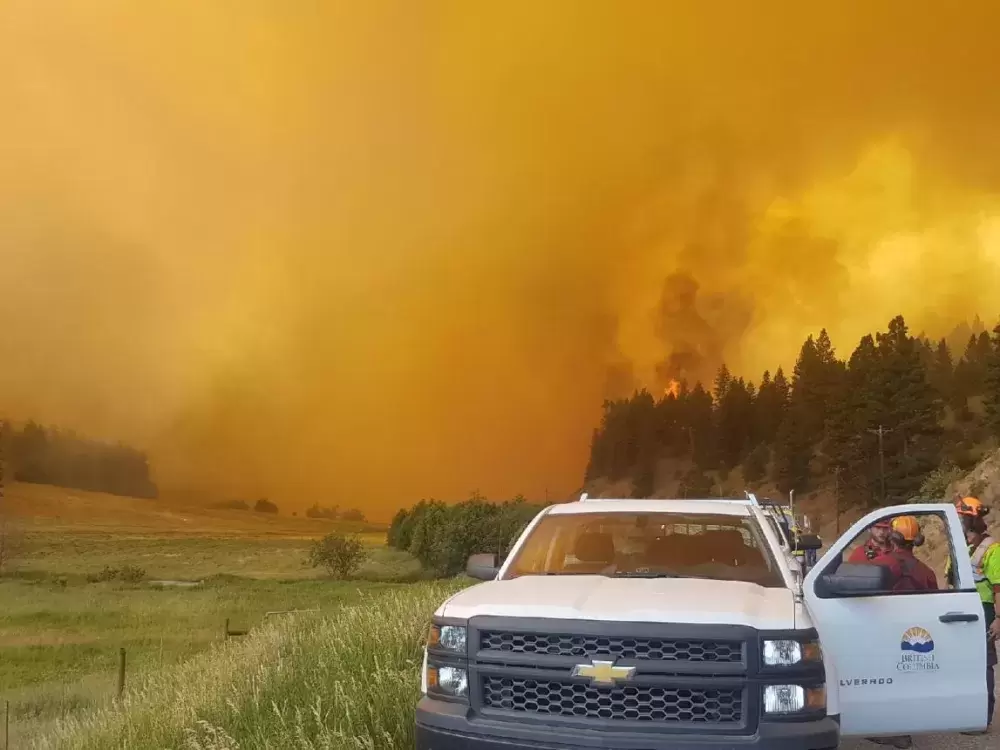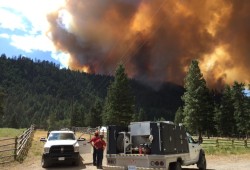With a large portion of the province on fire, Vancouver Island leaders are being vigilant about fire prevention and early suppression.
A state of emergency has been declared for central British Columbia as 140 wildfires rage through the Interior, forcing thousands of people to evacuate.
For Vancouver Island, burn bans came earlier than normal after a series of relatively small fires ignited along roadsides that were supressed quickly.
On July 6 a 10-hectare fire burned near Port McNeil in a logged out area of slash. Then, on July 12 a wildfire in Sooke was reported to have been sparked by a motorhome dragging something along Sooke Road. The resulting sparks ignited dry grass along the roadside and led to the loss on one home.
Also on July 12 another fire was sparked in a similar manner. An 18 wheeler is said to have cast off some hot metal bearings setting small, spotty fires along Highway 19 near Campbell River. The fire was extinguished by passersby who used shoes, a golf club and a sports drink to put out the small fires.
The first significant Island fire of the season happened near Port Alberni on June 25. The fire started at the base of Mt. Arrowsmith. Believed to be human-caused, the quick-spreading fire burned 15 hectares in a recently logged area of slash before it was extinguished. It was shortly after this fire that burn bans came into effect.
On Jul. 6 the BC Wildfire Service issued a bulletin banning all open fires and campfires in the Coastal Fire Centre’s jurisdiction except for Haida Gwaii and the fog zone.
The fog zone is a two-kilometre-wide strip along the outer coast of Vancouver Island, stretching from Owen Point (near, but not including Port Renfrew) north to the tip of Vancouver Island and around to the boundary of the District of Port Hardy. This strip extends inland two kilometres from the high-tide point.
July 13 the Alberni-Clayoquot Regional District closed the Alberni Inlet Trail, the Log Train Trail and Mt. Arrowsmith Regional Park due to extreme fire hazard in the Alberni Valley. They also imposed a campfire and open fire ban in all areas of the ACRD except for the fog zone.
Island Timberlands, a local logging company, has closed gates to the back country throughout the ACRD. “Weather conditions are creating high safety and environmental hazards in all areas of our land base. To ensure public safety and the protection of the forest, all areas, unless otherwise specified, are closed for access. Access to Lowry Lake and Scout Beach via Ash Main is now closed due to increasing fire hazard rating,” stated the Island Timberlands blog.
The City of Port Alberni has prohibited open fires from Jul 6 to Oct. 21, 2017 or until the public is otherwise notified.
The ongoing wildfires on the mainland are affecting many British Columbians, including First Nations. As of July 17 nearly 40,000 people have been displaced including First Nations communities.
Volunteer relief efforts have started including a $6,000 donation from Huu-ay-aht First Nation. The elected and hereditary leadership from Huu-ay-aht First Nation donated the money to the National Government Chiefs wildfire relief fund for the Tsilhqot’in. Six Tsilhqot’in communities have been evacuated from their homes. Huu-ay-aht First Nation had donated $1,000 for each of those communities and challenges other First Nations to do the same.
“The Tsilhqot’in Nations are facing one of the worst times of their history, one none of us can even imagine,” said Huu-ay-aht elected Chief Robert Dennis Sr., adding that it is important that we show our support during their time of crisis.
In a July 18 news release Assembly of First Nations Chief Perry Bellegarde noted that 20 British Columbia First Nations have been affected by the wildfires so far.
“We acknowledge the strength, resilience and in some cases the trauma associated with our families leaving their homes for safety,” said Bellegarde. “We convey our heartfelt appreciation to the firefighters, first responders, and countless volunteers and donors that have rallied across Canada to give their support to people in British Columbia,” he added.
“We commend the leadership demonstrated by First Nations and support provided by the First Nations Health Authority and the First Nations’ Emergency Services Society of BC in this time of great need. Our prayers are for the safety and security of everyone affected by the fires,” Bellegarde said.
He talked about an Indigenous practice of setting controlled fires in order to renew growth and also to burn off dry, dead fuel as a preventative forest fire measure. “We have heard from our communities in the Okanagan about their history as firekeepers and we must honour these roles and traditions passed down from generation to generation,” he said.
In Clearwater, B.C., firefighters planned a controlled burnoff in an effort to prevent the spread of a wildfire in their area. “The 3,035-hectare Dunn Lake Road wildfire is 30 per cent contained. Over 265 firefighters, 11 helicopters and 19 pieces of heavy equipment are dedicated to the Little Fort Complex fire,” read the BC Wildfire Services bulletin issued July 19.
At its height there were 180 wildfires burning in B.C. Today there are 140 wildfires burning province-wide. A state of emergency has been declared, triggering the release of emergency funds for the 45,000 evacuees.
There are several fires still burning out of control in the Interior and Caribou regions.
On July 19 weather reports indicate the possibility of rain, but it is not known if it will be enough stop the spread of the fires. In fact, there’s a chance the rain clouds may bring lightning which could make matters worse.
Premier John Horgan was sworn in Jul. 18, 2017. The following day he extended the province-wide state of emergency by two weeks, in effect, doubling funds to evacuees.
Evacuees that lost property were promised $600 each from a $100 million provincial emergency fund managed by the Red Cross; they will receive an additional $600 for each two weeks they are displaced.
"Our government will be ready to provide whatever support is needed in these difficult times. We are working closely with the outgoing government and our federal partners to deliver the support and services that are needed," said Premier Horgan in a statement.
In an information bulletin issued by the BC Wildfire Service on July 20, measures are being taken to enforce the campfire ban.
“Despite open burning prohibitions being implemented in the Coastal Fire Centre (with the exception of Haida Gwaii and the area known as the ‘Fog Zone’), the BC Wildfire Service continues to receive reports of the current campfire ban being ignored by members of the public.”
The bulletin goes on to say that between July 15 and 17, 2017, over 50 illegal campfires were reported to the Coastal Fire Centre. They are responding with increased patrols by both the Compliance and Enforcement Branch and the Conservation Officers Service. RCMP officers are also authorized to issue violation tickets under the Wildfire Act and Wildfire Regulation.
“Enforcement officers will be patrolling areas with a history of open burn violations to issue tickets to people participating in any prohibited activity; a ticket for ‘lighting, fuelling or use of fire against regulations’ carries a fine of $1,150 and would apply to every person in the vicinity of the fire,” according to the bulletin.
While provincial and municipal burn bans don’t apply to federal lands such as Indian Reservations, two Nuu-chah-nulth nations, Tseshaht and Hupacasath, are advising members not to have open fires.
“If the city has a burn ban, well, we’re just as dry as them so its common sense not to have open fires on reserve either,” said Art VanVolsen speaking on behalf of Hupacasath First Nation. He said smokehouses are a different story because the fires are contained in a fire ring inside smoke houses.
To report a wildfire or open burning violation, call 1 800 663-5555 toll-free or *5555 on a cellphone. For up-to-date information on current wildfire activity, burning restrictions, road closures and air quality advisories, call 1 888 3-FOREST or visit: www.bcwildfire.ca








